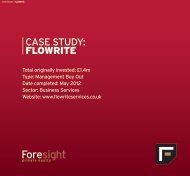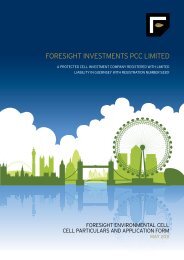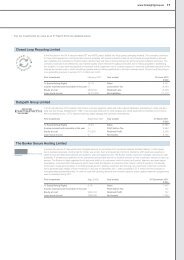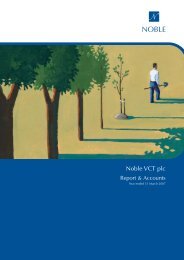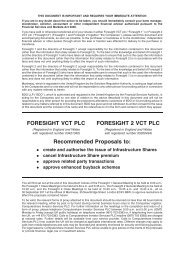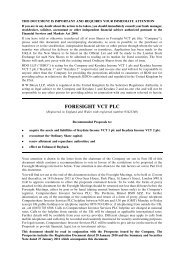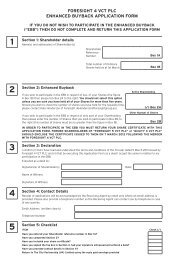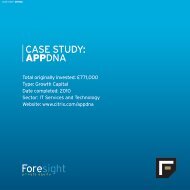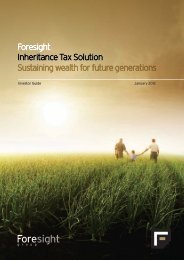FORESIGHT 4 VCT PLC - Foresight Group
FORESIGHT 4 VCT PLC - Foresight Group
FORESIGHT 4 VCT PLC - Foresight Group
Create successful ePaper yourself
Turn your PDF publications into a flip-book with our unique Google optimized e-Paper software.
7. CORPORATE GOVERNANCE<br />
7.1 Board of Directors<br />
The Company has a Board of three Non-Executive Directors, all of whom (other than Peter Dicks<br />
who is considered non-independent under the listing rules by virtue of being a director of several<br />
<strong>Foresight</strong> <strong>VCT</strong>s which are all managed by <strong>Foresight</strong> <strong>Group</strong>) are considered to be independent.<br />
Peter Dicks is also a director of <strong>Foresight</strong> <strong>VCT</strong> plc, <strong>Foresight</strong> 2 <strong>VCT</strong> plc, <strong>Foresight</strong> 3 <strong>VCT</strong> plc,<br />
<strong>Foresight</strong> 5 and <strong>Foresight</strong> Clearwater. The Board believes, having regard to the specialist nature of<br />
<strong>VCT</strong>s and the fact that <strong>Foresight</strong> advises a number of <strong>VCT</strong>s, that it is in the best interests of<br />
shareholders if, on each of the boards of the <strong>VCT</strong>s advised by <strong>Foresight</strong>, there are certain directors<br />
who are common. That is to say, a common director is able to assess how <strong>Foresight</strong> performs in<br />
respect of one fund with the valuable background knowledge of how well or badly <strong>Foresight</strong> is<br />
performing in relation to other funds for which he also has responsibility as a director. Where<br />
conflicts of interest arise between the different funds then the common director would seek to act<br />
fairly and equitably between different groups of shareholders. Where this is difficult or others might<br />
perceive that it was so, then decisions would be taken by the Directors who are not common<br />
directors. The most likely source of potential conflicts would normally be the allocation of<br />
investment opportunities but as these are allocated by <strong>Foresight</strong> pro rata to the cash raised by<br />
each fund, subject to the availability of funds, in practice such conflicts do not arise. Additionally,<br />
‘specialist funds’ may be allocated investments specific to their investment policy in priority to more<br />
generalist funds.<br />
The Board is responsible to shareholders for the proper management of the Company and meets<br />
at least quarterly and on an ad hoc basis as required. It has formally adopted a schedule of matters<br />
that are required to be brought to it for decision, thus ensuring that it maintains full and effective<br />
control over appropriate strategic, financial, operational and compliance issues. A management<br />
agreement between the Company and <strong>Foresight</strong> sets out the matters over which <strong>Foresight</strong> has<br />
authority, including monitoring and managing the existing investment portfolio and the limits above<br />
which Board approval must be sought. All other matters are reserved for the approval of the Board.<br />
<strong>Foresight</strong>, in the absence of explicit instruction from the Board, is empowered to exercise discretion<br />
in the use of the Company’s voting rights.<br />
Individual Directors may, at the expense of the Company, seek independent professional advice on<br />
any matter that concerns them in the furtherance of their duties. In view of its non-executive nature<br />
and the requirements of the Articles of Association that all Directors retire by rotation at the annual<br />
general meeting, the Board considers that it is not appropriate for the Directors to be appointed for<br />
a specific term as recommended by the UK Corporate Governance Code (formerly the Combined<br />
Code) (‘‘the Code’’) issued by the Financial Reporting Council (‘‘FRC’’) in May 2010 for all<br />
companies who are now operating in financial years on or after 29 June 2010. However, the Board<br />
has agreed that each Director will retire and, if appropriate, may seek re-election after three years’<br />
service and annually after serving on the Board for more than nine years. Non-independent<br />
Directors are required to retire annually. Full details of duties and obligations are provided at the<br />
time of appointment and are supplemented by further details as requirements change, although<br />
there is no formal induction programme for Directors as recommended by the Code. The Board has<br />
access to a company secretary who also attends all Board meetings. A representative of <strong>Foresight</strong><br />
attends all formal Board meetings although the Directors may meet without the manager being<br />
present. Informal meetings with management are also held between Board meetings as required.<br />
The company secretary provides full information on the Company’s assets, liabilities and other<br />
relevant information to the Board in advance of each Board meeting.<br />
In the light of the responsibilities retained by the Board and its committees and of the<br />
responsibilities delegated to <strong>Foresight</strong>, SGH Martineau LLP and the company secretary, the<br />
Company has not appointed a chief executive officer, deputy chairman or a senior independent<br />
non-executive director as recommended by the Code. The provisions of the Code which relate to<br />
the division of responsibilities between a chairman and a chief executive officer are, accordingly,<br />
not applicable to the Company.<br />
7.2 Committees and Directors’ performance evaluation<br />
The Board has adopted formal terms of reference, for three standing committees, namely the Audit<br />
Committee, Remuneration Committee and Nomination Committee, each of which makes<br />
recommendations to the Board in specific areas.<br />
71



